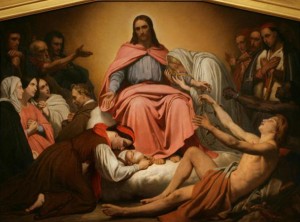Summary of Sermon – Rev. Chaney Sermon “Rod and Staff of God’s Comfort”
Church of Our Father


Mr. Chaney preached in the morning on the rod and staff of God’s comfort, showing that His consolations are strong in rebuke as well as tender in support; the rod of His correction laid athwart the stall of His support make the Christian’s cross. Ary Schoeffer‘s picture of Christ the Consoler, was taken to depict the fullness and breadth of Christian consolations. In the evening the subject of “Culture and kindness,” was treated in answer to a recent reproach of Unitarianism that this was all it stood for.
The preacher said that having preached four discourses on the piety of the heart, mind, soul and strength, he had shown what Unitarians believed and taught about our duty to God. He would now take up the second commandment, which Jesus had declared like unto the command to love God, viz: “Thou shalt love thy neighbor as thyself.” He showed how perfectly balanced this command was – not falling into the error of altruism on the one side, or egoism on the other—but stating in one sentence man’s equal duty to himself and to his neighbor. This command was exactly repeated in the charge just made against Unitarianism, that it emphasized culture and kindness. So it does. And it has a higher authority than any of the sects can offer, no less an authority than the head of the church for this emphasis. The best gift any man could make to the world would be his own best self. This was culture. This again could only be obtained through kindness to others. Mr. Chaney showed how naturally from the Unitarian teaching of self-respect and self-care, there had come the most original and fertile literature of America and the most able contributions to history, poetry and philanthropy. Channing‘s prophecy of inherent work in the human nature, which the popular theology had decried, was the inspiration of Emerson’s original thought and fertile writing. And Emerson more than any other American had -opened the mouth of genius wherever it exists in this country. At his feet or by his side were the poets, Longfellow, Lowell, Holmes. Among jurists Story, Hoar and Shaw confess the same honorable extraction. Everett, the Adamses for three generations, Sumner and Daniel Webster were Unitarian. Among historians, Sparks, Bancroft, Tickner, Palfrey, Parkman were Unitarians. Two of them Unitarian ministers and two the sons of such ministers. After illustrating at further length the grand roll of famous Unitarians, the preacher said that he delighted to match these eminent New England, names with those of the south; – Story with Marshall, Adams with Jefferson, Franklin with Washington, Webster with Calhoun, and it added to his delight to know that these giant minds were dearer to each other in their religious views and dearer to the views of Unitarianism, then they were to the prevailing orthodoxy of their gay.
Webster and Calhoun united in starting the Unitarian church in Washington; and the rivals of the forum bowed their heads together in the same church on Sunday. This was in the noon of their powers, when their minds were clearest and their thoughts most trustworthy.
The preacher closed his discourse by declaring that wherever minds were free and human nature was respected, there the gospel of culture and kindness as the human side of religion would be welcome and dear.